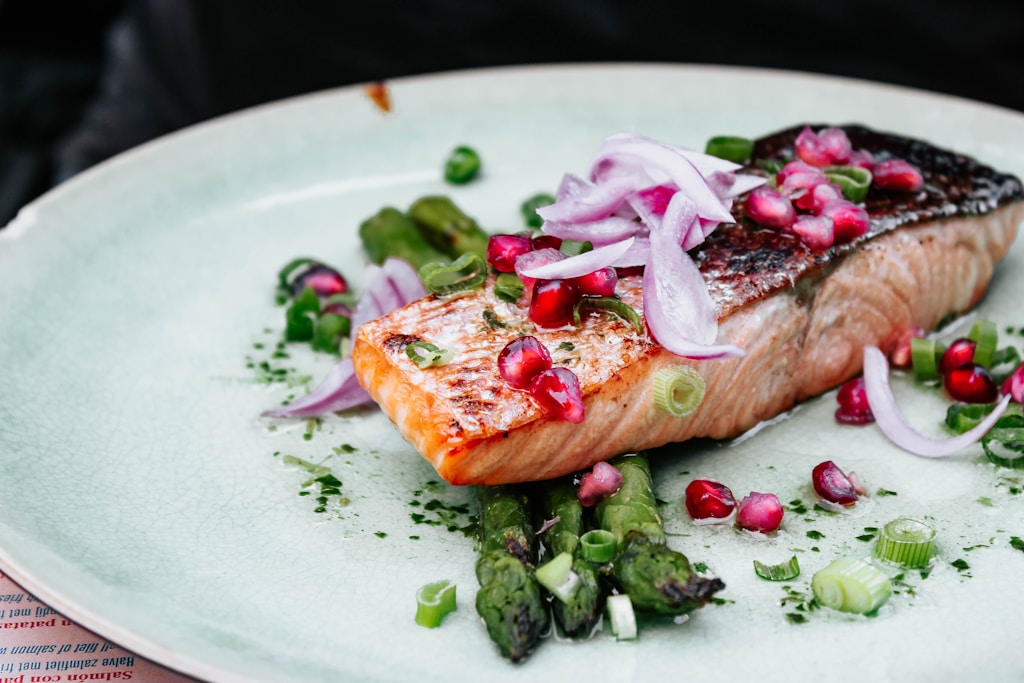Table of Contents
Many of us begin to worry about our cognitive health, especially once we reach a certain age.
It’s no secret that the brain changes as we age and our senior loved ones may be going through this.
We may experience memory loss or other cognitive impairments.
While there is no magic solution to prevent these changes, research has shown that diet can play a role in promoting brain health.
In this article, we’ll discuss some brain-boosting foods that seniors can incorporate into their diets.

Fatty fish such as salmon, tuna, and sardines are rich in omega-3 fatty acids. These healthy fats have been linked to improved brain function and decreased risk of cognitive decline. Omega-3s have anti-inflammatory properties that may protect the brain from damage.
There are several types of fatty fish that are beneficial for the cognitive health of seniors. Some examples include:

Berries are a rich source of antioxidants, which have been shown to promote brain health and improve cognitive function in seniors.
Specifically, berries contain a type of antioxidant called flavonoids, which can help reduce inflammation in the brain and protect against age-related cognitive decline.
Studies have found that regular consumption of berries may improve memory and overall cognitive function in older adults. For example, daily consumption of blueberries improved cognitive performance in older adults over a 12-week period.
Some popular types of berries that are particularly beneficial for cognitive health include blueberries, strawberries, blackberries, raspberries, and cranberries. Adding these fruits to a senior's diet can provide a delicious and nutritious way to support brain health and cognitive function.

Leafy greens such as spinach, kale, and collard greens are rich in vitamins and minerals that support brain health. They contain high levels of folate, which has been linked to improved cognitive function. They are rich in antioxidants and anti-inflammatory compounds.
Here’s a quick recipe for collard greens that your loved ones might enjoy.

Nuts such as almonds, walnuts, and cashews are rich in healthy fats, protein, and fiber. They also contain vitamin E, linked to improved cognitive function.
A study published in the Journal of Nutrition found that eating nuts regularly was associated with better cognitive performance in older adults.
Nuts that are lower in purines, which can contribute to uric acid build-up and gout flare-ups, include almonds, cashews, chestnuts, hazelnuts, macadamia nuts, and peanuts.
It's important to note that while these nuts are lower in purines compared to other types of nuts, they should still be consumed in moderation as part of a balanced diet.
If your loved ones have a history of gout or are concerned about your risk of developing it, it's best to consult with a healthcare professional before drastically increasing nut consumption.
Whole grains such as brown rice, quinoa, and oats are good sources of complex carbohydrates. Complex carbohydrates provide energy for the brain and body. Additionally, whole grains contain B vitamins, which have been linked to improved cognitive function.

Dark chocolate is rich in flavonoids, and antioxidants that can help protect the brain from damage.
Studies have linked regular consumption of dark chocolate to improved cognitive function in older adults.

Turmeric is a spice commonly used in Indian and Middle Eastern cuisine. It contains an active compound called curcumin, which has been shown to have anti-inflammatory properties.
Curcumin may also improve cognitive function by increasing the production of brain-derived neurotrophic factor (BDNF), a protein that promotes the growth of new brain cells.

Eggs are a good source of choline, a nutrient that is important for brain health. Choline is used to produce acetylcholine, a neurotransmitter that plays a role in memory and cognitive function. A study published in the American Journal of Clinical Nutrition found that higher intakes of choline were associated with better cognitive performance in older adults.

Avocados are high in healthy fats and are a good source of vitamin E.
Vitamin E has been linked to improved cognitive function and a lower risk of Alzheimer’s disease.
Avocados also contain potassium, which supports healthy blood pressure levels. High blood pressure has been linked to cognitive decline in older adults.
Incorporating these brain-boosting foods into your diet doesn’t have to be difficult.
Consider adding fatty fish to your meals a few times per week or snacking on nuts and berries throughout the day. You could also try adding leafy greens to your salads or smoothies.
Additionally, you can use turmeric to flavor your meals or enjoy a piece of dark chocolate as a treat.
It’s important to note that while diet can play a role in promoting brain health, it’s not the only factor. Other lifestyle factors such as exercise, social engagement, and regular mental stimulation are also important for cognitive health.
In conclusion, incorporating brain-boosting foods into your diet is a simple and delicious way to support cognitive health as you age.
By eating a balanced diet that includes fatty fish, berries, leafy greens, nuts, whole grains, dark chocolate, and turmeric, you can promote brain health and potentially reduce your risk of cognitive decline.
Now whats for lunch?
That's all for today.
Take care, keep mom safe at home and have a great day!
Winn